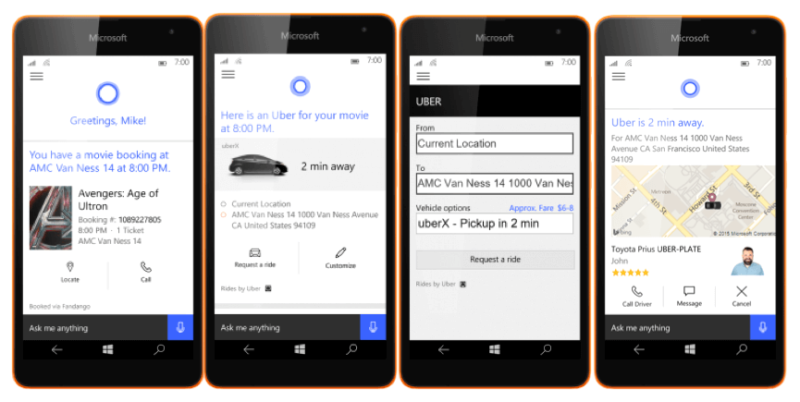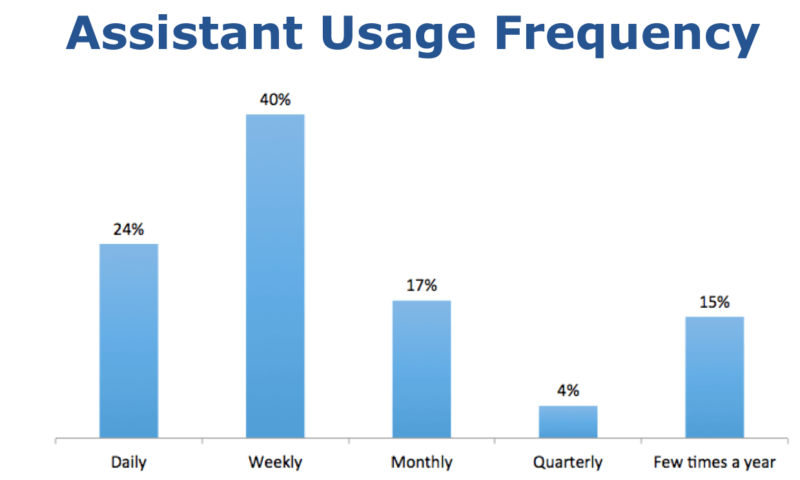For Task Completion, Cortana Now Integrates More Deeply With Apps
Third party app developers can now integrate content into the Cortana UI.
It’s fascinating to consider whether and how “destination search” and virtual assistants will interact in the future. In the case of Microsoft’s assistant Cortana, search is like the “Intel inside.” But Cortana is a much broader and more versatile tool than conventional search.
With Windows 10 Cortana is coming to the PC. Indeed Bing’s Director of Engineering Mike Calcagno sees Cortana as a kind of ambient UI that will be screen-agnostic or screen-independent in the future. Microsoft is betting on Cortana as a differentiator across screens and platforms.
At this week’s Build developer conference Microsoft announced deeper app integration into Cortana. As with Siri and Google, Cortana can launch apps. However Microsoft is also seeking content integration into Cortana so that tasks may be completed in the Cortana UI without necessarily launching the app in question.
Here’s one of the examples Microsoft provides in a blog post:
When integrating with Cortana, an application can choose to get launched or choose to interact with customers through Cortana’s user interface canvas. Immaterial of the actual method an app chooses to integrate with Cortana, she will always preserve and provide all context she has about the specific task at hand. For example, let’s say you use Viber to send messages to your friend Sam. When you say “Hey Cortana, Tell Sam Hood I’m running late using Viber,” Cortana will understand that you intend to send a message to Sam Hood and also you’d like to use Viber to complete the task and provide Viber all the context. Viber could then choose to handle this specific task by interacting with you through Cortana’s user interface.
It appears the developer will have control over whether to launch the app or complete the task in the Cortana UI.
The company also singled out Uber for broad Cortana integration in a number of use cases:
By integrating with Uber, Cortana will not only recommend an Uber for you at the exact time you need it based on your schedule, but will also order it for you. For example let’s say you’ve purchased a movie ticket online and received an email confirmation. Cortana has this information and will display a reminder to you prior to the movie start time.
Google is doing something quite similar by making Now a platform for developers with an expanded range of Google Now Cards featuring third party app content. The difference here is that Cortana integration appears to be somewhat deeper. Siri lags behind the other two in its evolution.
According to an October 2014 US consumer survey by Thrive Analytics, nearly two-thirds of respondents said they use smartphone digital assistants at least weekly.
Source: Thrive Analytics, October 2014 (n=2,058)
As these services and intelligence behind them get better there will be deeper and more frequent usage. Search (as in query in a box) has limited application in a world of multiple connected devices. However a voice-enabled conversational assistant (that uses search technology in the background) is a much broader and more useful tool.
Users are much more commonly seeking direct answers or to complete tasks in using search than looking to sift through a bunch of documents that then lead them to answers or actionable choices. This is further amplified in a mobile context.
Virtual assistants such as Cortana will be increasingly oriented to “getting things done” or providing direct answers to users vs. a range of information sources or options. The implications of this emerging shift for SEO, SEM and publishers overall are profound.
Contributing authors are invited to create content for Search Engine Land and are chosen for their expertise and contribution to the search community. Our contributors work under the oversight of the editorial staff and contributions are checked for quality and relevance to our readers. The opinions they express are their own.
Related stories


